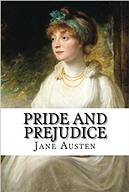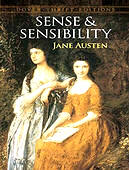|
 |
Jane
Austen was born in Steventon, Hampshire, where her father was a rector.
She was the second daughter and seventh child in a family of eight. She
was mostly tutored at home, and irregularly at school. Her parents were
avid readers and she received a broader education than many women of her
time. Her father supported his daughter's writing aspirations and tried
to help her get a publisher. Austen first gave the novel its modern character through the
treatment of everyday life. Although she was widely read in her
lifetime, she published her works anonymously. The most urgent
preoccupation of her young, well-bred heroines is courtship, and finally
marriage in the world dominated by men. Austen herself never married.
Her best-known books include Pride and Prejudice (1813) and Emma (1816).
Virginia Woolf called her "the most perfect artist among
women." |
|
|
Click
on the cover to download your book / Haz clic en la tapa
del libro para
descargarlo. |
|
 |
EMMA
Surrey
(England), fiction, 19th. century, social life and customs
The protagonist, Emma
Woodhouse, is a wealthy, pretty, self-satisfied young woman. She is left
alone with her hypochondriac father. Her governess, Miss Taylor, marries
a neighbor, Mr. Weston, and blind to her own feelings, he indulges
himself with meddlesome and unsuccessful attempts at matchmaking among
her friends and neighbors. She makes a protégée of Harriet Smith, an
illegitimate girl of no social status and tries to manipulate a marriage
between Harriet and Mr. Elton, a young clergyman, who has set his sight
on Emma. Emma has feelings about Mr. Weston's son. When Harriet becomes
interested in George Knightley, a neighboring squire who has been her
friend, Emma starts to understand her own limitations. He has been her
moral adviser, and secretly loves her. Finally Emma finds her destiny in
marriage with him. Harriet, who is left to decide for herself, marries
Robert Martin, a young farmer. |
|
|
|
 |
PRIDE AND PREJUDICE
England, fiction,
late 18th. century to early 19th. century, social life and customs
The story deals with issues
surrounding courtship and marriage among the landed gentry in the late
18th century and early 19th century. The main character is Elizabeth Bennet, a 20-year-old woman possessed of a quick mind, sharp wit, and
keen sense of justice. Elizabeth's father, Mr. Bennet, spends much of
his time hiding in his study, a refuge from Elizabeth's bothersome
mother. Mrs. Bennet (whose manners and conduct are decidedly "of the
people") is determined to see each of her five daughters successfully
married to a gentleman of sufficient fortune to support a wife. Marriage
plays a huge role in Pride and Prejudice. Some characters marry for
security, some marry for wealth and some marry for love. The idea of
marriage is very important throughout the novel, primarily because it
was often the only way for a woman of the period to secure her freedom,
social status, and living standard. |
|
|
|
 |
SENSE AND SENSIBILITY
England, fiction,
19th. century, social life and customs
In Mansfield Park, for example,
Austen gives us Fanny Price, a poor young woman who has grown up in her
wealthy relatives' household without ever being accepted as an equal.
The only one who has truly been kind to Fanny is Edmund Bertram, the
younger of the family's two sons. Into this Cinderella existence comes
Henry Crawford and his sister, Mary, who are visiting relatives in the
neighborhood. Soon Mansfield Park is given over to all kinds of gaiety,
including a daring interlude spent dabbling in theatricals. Young Edmund
is smitten with Mary, and Henry Crawford woos Fanny. Yet these two
charming, gifted, and attractive siblings gradually reveal themselves to
be lacking in one essential Austenian quality: principle. Without good
principles to temper passion, the results can be disastrous, and indeed,
Mansfield Park is rife with adultery, betrayal, social ruin, and
ruptured friendships. |
|
All
contents is for educational and informational use only. All books remain the right of the original copyright holder, and no infringment is
here intended / Todo
el contenido es pura y exclusivamente para uso educativo e informativo. Todos
los libros continúan permaneciendo al poseedor original de los derechos autorales, no existiendo aquí intención alguna de infringir la ley. |
|